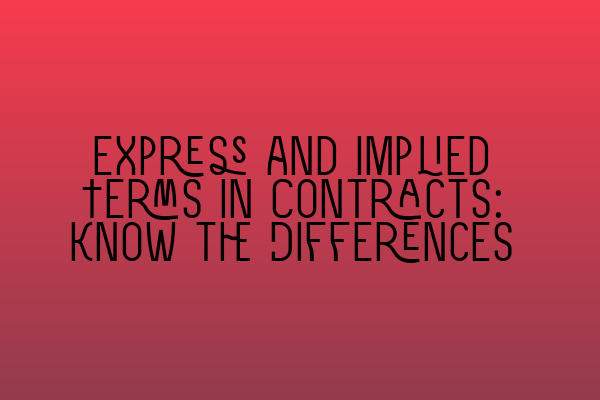Express and Implied Terms in Contracts: Know the Differences
Contracts are an essential component of every business transaction. They help establish the rights and obligations between two or more parties, providing a legal framework for conducting business. Within these contracts, various terms govern the relationship between the parties involved. These terms can be categorized into two main types: express terms and implied terms. Although both types of terms are important, understanding the differences between them is crucial to ensure clarity and avoid any potential disputes. In this article, we will delve into the distinctions between express and implied terms in contracts, providing you with a comprehensive understanding of both.
Express Terms: Explicitly Stated
Express terms are the explicit and clearly stated clauses within a contract. These terms are specifically agreed upon by the parties involved and are usually set out in writing, either in a formal agreement or a written exchange of terms. Express terms are the backbone of a contract, as they define the rights and obligations of each party. They can cover various aspects of the agreement, including but not limited to the subject matter, price, payment terms, delivery terms, quality standards, and dispute resolution mechanisms.
Express terms provide certainty and transparency, as both parties are aware of their rights and duties. They leave no room for ambiguity or misunderstandings. It is important to draft express terms clearly and precisely to avoid any potential conflicts in the future. Working with a solicitor can greatly assist in ensuring that the express terms are robust, fair, and comprehensive.
Implied Terms: Unspoken Assumptions
While express terms are explicitly discussed and agreed upon by the parties, implied terms are not directly stated but are assumed to be a part of the contract based on various legal and practical considerations. Implied terms are the terms that the law or custom adds to a contract to give it efficacy and practicality. They fill in the gaps left by the express terms and help establish the real intentions of the parties.
Implied terms can be divided into two categories: terms implied by law and terms implied by custom. Terms implied by law are those imposed by legislation or the courts to ensure fairness and equity in contractual relationships. These terms are considered essential to the contract, even if they were not explicitly discussed or agreed upon. Examples of implied terms by law include the sale of goods being of satisfactory quality and fit for purpose.
On the other hand, terms implied by custom are those that are commonly understood and expected in a particular trade or industry. These terms are not explicitly stated but are presumed to be a part of the agreement due to the nature of the transaction. Customary terms vary across industries, and it is essential to be aware of them when entering into contracts within specific sectors.
Understanding the presence and extent of implied terms is crucial, as they may significantly impact the interpretation and performance of a contract. Failing to consider implied terms may lead to misunderstandings or disputes between the parties involved. Therefore, it is important to consult with a solicitor who can help identify and incorporate any relevant implied terms into the contract.
In conclusion, express and implied terms play distinct roles in contracts. Express terms are the explicitly stated clauses that set out the rights and obligations of the parties, leaving no room for uncertainty. On the other hand, implied terms fill in the gaps and provide practicality to the contract, either through legislation or custom. Both types of terms are equally important, and understanding the differences between them is vital to ensure a clear and effective contractual relationship.
If you found this article helpful, you may also be interested in reading these related articles:
– Barrister vs. Solicitor: A Comprehensive Comparison
– Embracing the Rise of Virtual Law Practices
– Unveiling Real-Life Case Studies: Insights into Legal Practice and Decision-Making
– Exploring Solicitor Salaries in the UK: Average Earnings and Factors Affecting Income
– Mastering Client Relationship Management: Skills for Solicitors to Enhance Trust and Loyalty
Remember, a well-drafted contract that incorporates both express and implied terms sets the foundation for a successful business partnership. Consulting with a knowledgeable solicitor ensures that your contract covers all essential aspects and provides clarity and protection for all parties involved.
